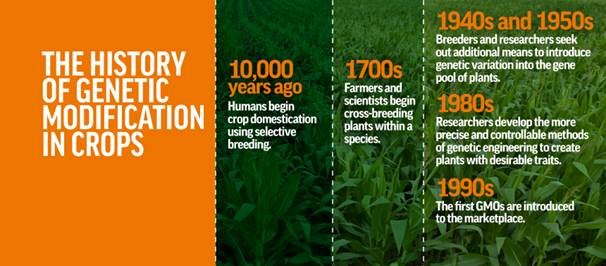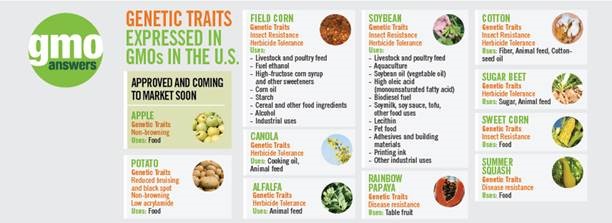Question
How long have GMOs been around?
how long have gmos been around
Submitted by: 2015752
Answer
Expert response from Community Manager
Moderator for GMOAnswers.com
Friday, 30/10/2015 14:28
GMOs, or genetically modified organisms, in agriculture refer to plants that have been modified using genetic engineering. GM crops have been around for more than 25 years.
DNA was discovered in the 1950s, and genetically engineered plants were first field tested in the 1980s, just a few years after the U.S. Food and Drug Administration approved the first GMO drug, which was a form of human insulin.

Although there are no GM tomatoes currently on the market, the first GM crop to be commercialized was the Flavr Savr tomato in 1994. Nine GM crops are currently commercially available in the United States: corn (field and sweet), canola, alfalfa, soybean, papaya, cotton, sugar beet, summer squash and potato. A GM apple has also been approved and will be coming to market soon.

You can learn more about the role of innovation in modern agriculture in the video below.
If you have additional questions about GMOs – please ask!
Answer
Expert response from Community Manager
Moderator for GMOAnswers.com
Friday, 30/10/2015 14:28
GMOs, or genetically modified organisms, in agriculture refer to plants that have been modified using genetic engineering. GM crops have been around for more than 25 years.
DNA was discovered in the 1950s, and genetically engineered plants were first field tested in the 1980s, just a few years after the U.S. Food and Drug Administration approved the first GMO drug, which was a form of human insulin.

Although there are no GM tomatoes currently on the market, the first GM crop to be commercialized was the Flavr Savr tomato in 1994. Nine GM crops are currently commercially available in the United States: corn (field and sweet), canola, alfalfa, soybean, papaya, cotton, sugar beet, summer squash and potato. A GM apple has also been approved and will be coming to market soon.

You can learn more about the role of innovation in modern agriculture in the video below.
If you have additional questions about GMOs – please ask!